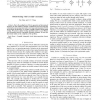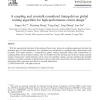203
click to vote
TCAD
2011
14 years 9 months ago
2011
Abstract—This work introduces GRIP, a global routing technique via integer programming. GRIP optimizes wirelength and via cost directly without going through a traditional layer ...
132
click to vote
ISLPED
2010
ACM
15 years 2 months ago
2010
ACM
This paper proposes a framework for (signal) interconnect power optimization at the global routing stage. In a typical design flow, the primary objective of global routing is mini...
128
click to vote
EURODAC
1995
IEEE
15 years 5 months ago
1995
IEEE
DPLAYOUT is a layout synthesis tool for bit-sliced datapath designs targeting standard-cell libraries. We developed fast and efficient heuristics for placing the cells in a bit-s...
152
click to vote
ICCAD
2007
IEEE
15 years 6 months ago
2007
IEEE
Due to the recent advances in microfluidics, digital microfluidic biochips are expected to revolutionize laboratory procedures. One critical problem for biochip synthesis is the dr...
119
click to vote
DAC
2010
ACM
15 years 6 months ago
2010
ACM
We propose a parallel global routing algorithm that concurrently processes routing subproblems corresponding to rectangular subregions covering the chip area. The algorithm uses a...
119
click to vote
ASPDAC
2009
ACM
15 years 6 months ago
2009
ACM
The number of vias generated during the global routing stage is a critical factor for the yield of final circuits. However, most global routers only approach the problem by chargin...
133
click to vote
DAC
1998
ACM
15 years 6 months ago
1998
ACM
—Due to the scaling down of device geometry and increasing of frequency in deep submicron designs, crosstalk between interconnection wires has become an important issue in very l...
124
click to vote
ICCAD
2000
IEEE
15 years 6 months ago
2000
IEEE
In this paper, we propose a new approach for VLSI interconnect global routing that can optimize both congestion and delay, which are often competing objectives. Our approach provi...
116
click to vote
GLVLSI
2000
IEEE
15 years 6 months ago
2000
IEEE
We present a novel global routing and cross-point assignment methodology for sea-of-gates (SOG) designs. Using the proposed congestion driven spanning trees (CDST), and continuous...
117
click to vote
ASPDAC
2004
ACM
15 years 7 months ago
2004
ACM
With the exponential reduction in the scaling of feature size, inter-wire coupling capacitance becomes the dominant part of load capacitance. Two problems are introduced by coupli...




